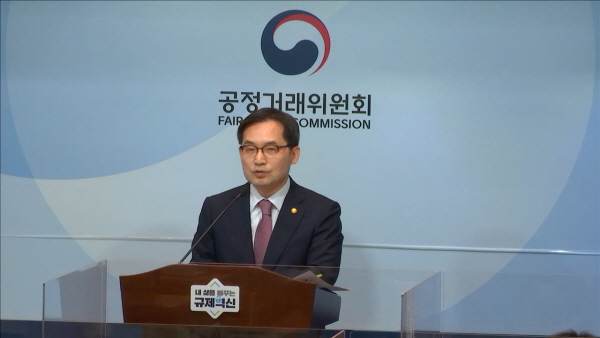공정거래위원회(위원장 한기정)는 브로드컴이 부품 선적 중단 등 불공정한 수단을 통해 삼성전자에게 일방적으로 불리한 부품 공급에 관한 장기계약(Long Term Agreement, 이하 ‘LTA’) 체결을 강제해 불이익을 제공한 행위에 대해 시정명령과 과징금 191억원(잠정)을 부과하기로 결정했다.
부품 선적 중단 등 불공정 수단으로 장기 공급계약 강제
브로드컴이 부품 선적 중단 등 불공정한 수단을 통해 삼성전자가 경쟁사업자의 부품을 사용하지 못하게 한 행위를 저질러 철퇴를 맞았다.
공정거래위원회(위원장 한기정)는 브로드컴이 부품 선적 중단 등 불공정한 수단을 통해 삼성전자에게 일방적으로 불리한 부품 공급에 관한 장기계약(Long Term Agreement, 이하 ‘LTA’) 체결을 강제해 불이익을 제공한 행위에 대해 시정명령과 과징금 191억원(잠정)을 부과하기로 결정했다.

▲한기정 공정거래위원회 위원장이 브로드컴 인코포레이티드 등 4개사의 거래상지위 남용행위 제재에 대해 발표하고 있다.
브로드컴은 스마트폰, 태블릿PC 등 스마트기기에 사용되는 최첨단, 고성능 무선통신 부품에서 압도적인 시장 점유율을 가진 반도체 사업자이다.
당시 삼성전자와 애플은 프리미엄 스마트기기 시장에서 치열하게 경쟁하는 상황이었고, 삼성전자 등은 고가의 프리미엄 스마트기기에 탑재되는 최첨단, 고성능 부품의 대부분을 브로드컴에 의존하고 있었다.
반면에 2018년부터 일부 부품에서 경쟁이 시작되자 2019년 12월 삼성전자가 경쟁사업자로 이탈하지 못하게 하고, 장기간 매출을 보장받고자 브로드컴은 사전에 치밀한 검토를 거쳐 독점적 부품 공급상황을 이용한 LTA 체결 전략을 수립했다.
당시 삼성전자는 브로드컴이 사실상 독점하던 시장에서 일부 경쟁이 도입되기 시작하자, 부품 공급선 다원화 정책을 추진하기 위해 LTA 체결 의사가 전혀 없었고, 기회비용 및 심각한 재정손실 등을 이유로 브로드컴의 요구를 지속적으로 거부했다.
이에 브로드컴은 2020년 2월부터 삼성전자에 대한 부품 구매주문승인 중단, 선적 중단, 기술지원 중단 등 일련의 불공정한 수단을 동원하여 LTA 체결을 압박했다.
선적 중단 및 구매주문 미승인 등으로 인한 심각한 공급차질로 삼성전자는 2020년 3월27일 2021년부터 3년간 매년 브로드컴의 부품을 최소 7.6억달러 구매하고, 실제 구매금액이 7.6억 달러에 미달하는 경우 차액을 배상하는 내용의 LTA에 서명했다.
브로드컴은 당시 삼성전자가 부품공급 다원화 전략에 따라 경쟁사업자의 부품을 일부 채택하자, 해당 경쟁사업자를 자신의 ‘증오스러운 경쟁자(hated competitor)’라 칭하며 삼성전자에 강한 불만을 제기한 이후 LTA가 본격적으로 논의되는 등 이 사건은 경쟁사업자를 배제하기 위해 추진됐다.
또한 브로드컴은 당시 삼성전자에 취한 ‘구매주문승인 중단, 선적 중단’ 조치에 대해 스스로 ‘폭탄 투하’, ‘핵폭탄’에 비유하고 ‘기업윤리에 반하는’, 삼성전자에 대한 ‘협박’이라고 생각하는 등 삼성전자가 심각한 상황에 처할 것을 인지하고 있었다.
반면에 삼성전자는 당시 브로드컴의 선적 중단 등의 조치로 인해 협상에서 매우 불리했고, 브로드컴의 일방적 요구를 수용할 수밖에 없는 절박한 상황에 있었다. 이러한 삼성전자의 상황은 당시 ‘생산라인에 차질이 우려된다’, ‘가진 카드가 없다’, ‘브로드컴이 급한 게 아니니 조금만 기다려 달라’라는 메일 내용에서도 잘 드러난다.
브로드컴에 의해 강제된 이 사건 LTA를 이행하기 위해 삼성전자는 당초 채택했던 경쟁사 제품을 브로드컴 부품으로 전환했다.
또한 구매 대상이 아닌 보급형 모델에까지 브로드컴 부품을 탑재하고 다음연도 물량을 선구매하는 등 가용 수단을 총동원해 8억달러의 부품을 구매할 수밖에 없었다.
이에 따라 삼성전자는 2021년 출시한 갤럭시 S21에 당초 경쟁사업자의 부품을 탑재하기로 결정했으나, 결국 이를 파기하고 브로드컴의 것을 채택할 수밖에 없는 등 부품 공급 다원화 전략을 지속할 수 없었고, 선택권이 제한됐다. 또한 브로드컴의 부품은 경쟁사업자보다 비싸 단가 인상으로 인한 금전적 불이익도 발생했다.
아울러 LTA로 삼성전자의 부품 선택권이 제한되자, 브로드컴의 경쟁사업자들은 제품의 가격과 성능에 따라 정당하게 경쟁할 기회를 빼앗겼다. 또한 장기적으로는 부품제조사의 투자 유인이 없어져 혁신이 저해되고, 소비자에게 피해가 전가될 상황을 초래했다.
공정위는 이러한 브로드컴의 행위가 거래상대방에 대해 우월적 지위를 남용한 행위에 해당한다고 판단했다.
공정위의 이번 조치는 브로드컴과 같은 반도체 분야 선도기업이 자신의 우월적 지위를 이용해 거래상대방에게 불이익을 주고, 관련 시장에서의 경쟁을 제한하는 행위를 억제함으로써 기술혁신의 핵심 기반 산업인 반도체 시장에서의 공정한 거래질서를 확립하고 경쟁 여건을 조성하였다는 점에서 의의가 있다.
특히 반도체 시장은 스마트기기, 자동차, 로봇, 인공지능(AI) 등 전방산업 및 반도체 소재·부품·장비 등 후방산업과 긴밀하게 연계되어 상호작용한다는 점에서 이 시장에서의 공정한 거래질서 회복은 연관 시장에까지 파급효과가 미칠 수 있다는 점에서 더욱 의미를 가진다.
